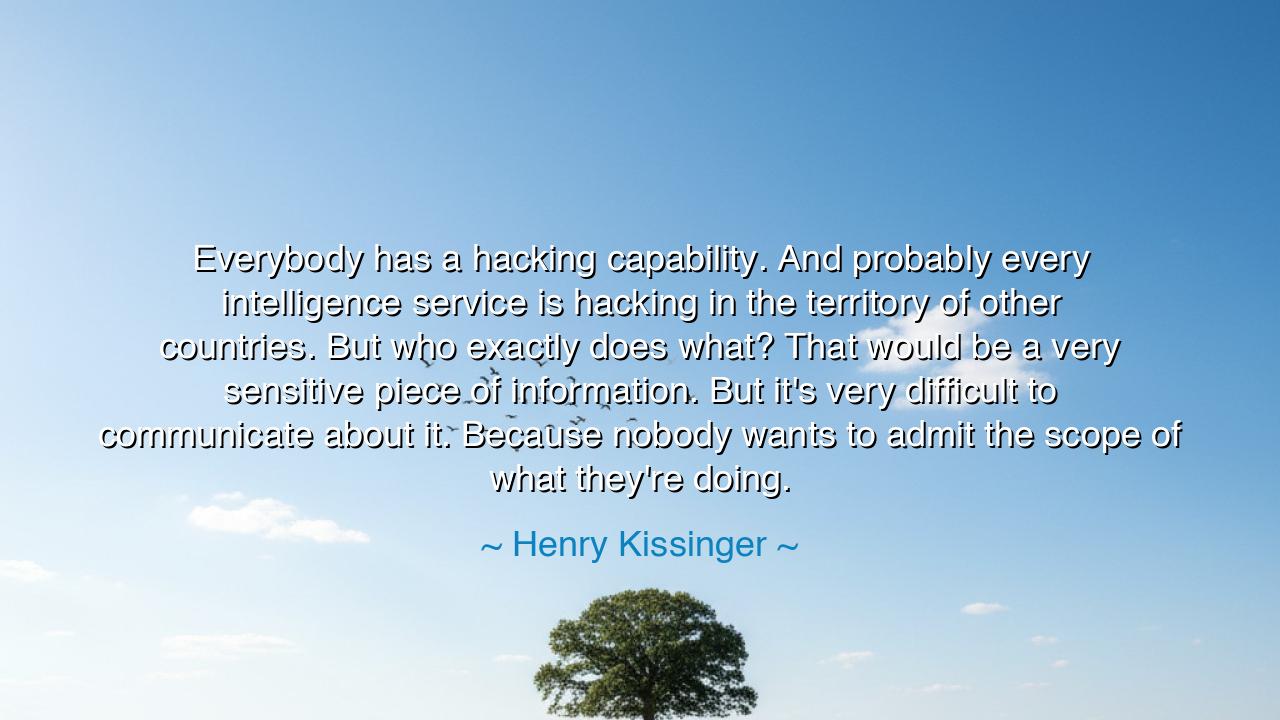
Everybody has a hacking capability. And probably every
Everybody has a hacking capability. And probably every intelligence service is hacking in the territory of other countries. But who exactly does what? That would be a very sensitive piece of information. But it's very difficult to communicate about it. Because nobody wants to admit the scope of what they're doing.






The words of Henry Kissinger — “Everybody has a hacking capability. And probably every intelligence service is hacking in the territory of other countries. But who exactly does what? That would be a very sensitive piece of information. But it's very difficult to communicate about it. Because nobody wants to admit the scope of what they're doing.” — carry the weight of centuries of political deceit and human cunning. Behind these words lies not just a commentary on modern technology, but a timeless reflection on power, secrecy, and the masks nations wear. For though the tools have changed — swords replaced by servers, armies by algorithms — the struggle for control, knowledge, and dominance remains as ancient as civilization itself.
When Kissinger speaks of hacking capability, he speaks of the eternal human hunger to see without being seen, to know without being known. Once, kings sent spies into enemy camps. Today, governments send code into foreign networks. Yet the essence is unchanged — knowledge is power, and power is never shared freely. To admit one’s actions in this invisible war would be to expose one’s vulnerabilities. Thus, the world turns beneath veils of denial and half-truths, where every nation points fingers outward while concealing its own hand within the shadows. It is the theater of global hypocrisy, where silence is strategy and admission is weakness.
This truth is not new. The great empires of the past — Egypt, Persia, Rome, China — all rose and fell on the strength of their information networks. In ancient times, couriers carried scrolls of secrets; now, data flows through invisible channels of light. Consider the story of the Enigma Code in the Second World War. The German military believed their communication unbreakable, their words locked in a cipher none could read. Yet British minds, led by Alan Turing, quietly cracked the code — turning the tide of war without the enemy even knowing. It was not brute force that won the battle, but intelligence hidden within intelligence, the power to penetrate the unseen. And even after victory, Britain concealed their success for decades — because in the world of secrets, the greatest triumph is the one no one knows.
Kissinger’s reflection reveals the tragic irony of our age: that everyone is watching, yet no one admits to looking. The digital realm, vast and borderless, has become the new battlefield where no shot is fired but many are wounded. Nations spy on allies as well as enemies, fearing that trust itself is a liability. And still, they speak in public of diplomacy, cooperation, and peace — while in private, the invisible war never ceases. Thus, humanity advances in technology but remains primitive in morality. We build machines to connect hearts, then use them to divide minds.
Yet beneath this web of deception lies a deeper insight into the nature of truth. In every age, truth has been the most dangerous weapon. Those who hold it wield influence; those who reveal it invite ruin. This is why, as Kissinger says, it is “difficult to communicate about it.” To confess the full extent of spying would be to unravel the illusions that keep nations stable. Civilization itself, it seems, depends on a fragile balance between what is known and what is hidden. Too much exposure, and chaos erupts. Too much secrecy, and corruption festers.
But the lesson here is not merely for governments — it is for every soul that walks the modern world. Each of us now lives with our own hacking capability: the ability to invade another’s privacy, to manipulate, to conceal. The temptation to peer behind the curtain, to use knowledge for advantage, whispers to all. Yet power without conscience leads only to decay. The ancient sages taught: “He who knows the secrets of others must guard his own heart.” In the digital age, that wisdom rings louder than ever. Integrity, not access, must be the measure of greatness.
So, let Kissinger’s words stand as a mirror to our times. Power thrives in darkness, but wisdom demands light. To hack is human — to restrain is divine. Let every generation remember that the pursuit of knowledge must be tempered with humility, and that in every act of surveillance lies the risk of self-destruction. The true strength of a nation, and of a person, is not in how deeply they can see into others’ secrets — but in how honestly they face their own.






AAdministratorAdministrator
Welcome, honored guests. Please leave a comment, we will respond soon